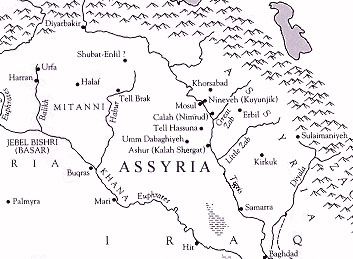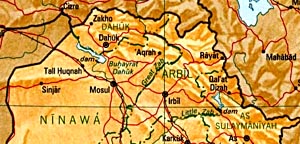
 The Assyrians are the indigenous people of Mesopotamia and have a
history spanning over 6700 years. Today, the Assyrians are the descendants of the ancient
Assyrian Empire and one of the earliest civilizations emerging in Mesopotamia. Although
the Assyrian empire ended in 612 B.C., history is replete with recorded details of the
continuous persistence of the Assyrian people till the present time. Assyrian civilization
at one time incorporated the entire Near East, most notably the area of the Fertile
Crescent. The heartland of Assyria lies in present day Northern Iraq. The remains of the
ancient capital of Assyria, Nineveh, lie next to Mosul in Northern Iraq.
The Assyrians are the indigenous people of Mesopotamia and have a
history spanning over 6700 years. Today, the Assyrians are the descendants of the ancient
Assyrian Empire and one of the earliest civilizations emerging in Mesopotamia. Although
the Assyrian empire ended in 612 B.C., history is replete with recorded details of the
continuous persistence of the Assyrian people till the present time. Assyrian civilization
at one time incorporated the entire Near East, most notably the area of the Fertile
Crescent. The heartland of Assyria lies in present day Northern Iraq. The remains of the
ancient capital of Assyria, Nineveh, lie next to Mosul in Northern Iraq.
The world’s 4.5 million Assyrians are currently dispersed with members of the Diaspora comprising nearly one-third of the population. Most of the Assyrians in the Diaspora live in North America, Europe, and Australia. The remaining Assyrians reside primarily in Iraq, Syria, Iran, Lebanon, and Turkey.
 The Assyrians are not to be confused with Syrians. Although the
name of Syria is directly derived from Assyria and the land was once a part of Assyria the
people of Syria currently maintain a separate Arab identity. The Assyrians are not Arabs,
but rather have maintained a continuous and separate identity, language, and culture that
predates the Arabization of the Near East. Until today, the Assyrians speak a distinct
language, Syriac, the language spoken by Jesus Christ. As a Semitic language, the Assyrian
language is related to Hebrew and Arabic but predates both.
The Assyrians are not to be confused with Syrians. Although the
name of Syria is directly derived from Assyria and the land was once a part of Assyria the
people of Syria currently maintain a separate Arab identity. The Assyrians are not Arabs,
but rather have maintained a continuous and separate identity, language, and culture that
predates the Arabization of the Near East. Until today, the Assyrians speak a distinct
language, Syriac, the language spoken by Jesus Christ. As a Semitic language, the Assyrian
language is related to Hebrew and Arabic but predates both.
The Assyrians were the first to accept Christianity in the first century A.D. Despite the subsequent Islamic conquest of the region, the Assyrian Church flourished and its adherents at one time numbered 80,000,000. Assyrian missionary zeal was unmatched and led to the first Christian missions to China and Japan. Today, the Assyrians belong to three major Christian sects: the Church of the East, the Chaldean Church, and the Syrian Orthodox Church. Branches of these Churches have led to other Christian Assyrian Churches. A direct consequence of the Assyrian adherence to the Christian faith has been persecution, massacres, and ethnic cleansing by various waves of non-Christian neighbors, which ultimately led to a decimation of their numbers.
Great Britain invited most recently and tragically, the Assyrians as an ally in World War One. The Assyrians were drawn into the conflict following successive massacres against the civilian population by forces of the Ottoman Empire consisting of Turks and Kurds. As a direct result of the conflict over two-thirds of the Assyrian population were massacred. Most of the remaining Assyrians were driven out of their ancestral homeland in Turkish Mesopotamia primarily toward the area of Mosul Vilayet in Iraq, Jazira in Syria, and the Urmiah plains of Iran. The massacres of 1915 followed the Assyrians to these areas as well, prompting a massive exodus to other countries and continents.
 The Allies, namely Britain, had promised the Assyrians autonomy,
independence, and a homeland. However, with the termination of the British Mandate in
Iraq, the Assyrian question was turned over to the Iraqi government with certain minority
guarantees specifically concerning freedom of religious, cultural, and linguistic
expression. The Assyrians in Iraq have subsequently been denied recognition of their
ethnic heritage and have been discriminated against politically by the government.
Moreover, the guarantees of freedom of religious, cultural, and linguistic expression have
not been realized. The Assyrian identity entails an inextricably intertwined combination
of language, culture, and religion such that to deny full expression of any one element
threatens the Assyrian identity as a whole.
The Allies, namely Britain, had promised the Assyrians autonomy,
independence, and a homeland. However, with the termination of the British Mandate in
Iraq, the Assyrian question was turned over to the Iraqi government with certain minority
guarantees specifically concerning freedom of religious, cultural, and linguistic
expression. The Assyrians in Iraq have subsequently been denied recognition of their
ethnic heritage and have been discriminated against politically by the government.
Moreover, the guarantees of freedom of religious, cultural, and linguistic expression have
not been realized. The Assyrian identity entails an inextricably intertwined combination
of language, culture, and religion such that to deny full expression of any one element
threatens the Assyrian identity as a whole.
Following dispersal and decimation of the Assyrian population, Assyrian identity has been under tremendous attack during this century. Historically, the Assyrians’ neighbors have repeatedly attempted to Arabize, Kurdify, Turkify, or Persify the Assyrians. Scarcely has there ever been political recognition of the true distinct Assyrian identity. And, naturally, all their neighbors share in the common attempt to Islamicize the Assyrian Christians.
Following the Gulf War of 1991, the United Nations established a safe haven in Northern Iraq above the 36th parallel for protection of the Assyrian, Kurdish, Turkoman, and other minorities of Northern Iraq while simultaneously recognizing the sovereignty and territorial integrity of Iraq.
 Despite early hopes for an inclusive and progressive democracy
with respect for all of the communities of Northern Iraq, the situation rapidly
deteriorated over the past few years Control of the area fell into the hands of two
competing Kurdish armed factions. Humanitarian aid earmarked for al I the inhabitants of
the region was completely monopolized by these 2 armed factions and served to exacerbate
tensions.
Despite early hopes for an inclusive and progressive democracy
with respect for all of the communities of Northern Iraq, the situation rapidly
deteriorated over the past few years Control of the area fell into the hands of two
competing Kurdish armed factions. Humanitarian aid earmarked for al I the inhabitants of
the region was completely monopolized by these 2 armed factions and served to exacerbate
tensions.
The ensuing conflict left thousands dead and thousands more wounded. Those people and communities not aligned with either of the two Kurdish groups lived in fear and intimidation.
Various international human rights organizations including Amnesty International, Human Rights Watch as well as the United Nations and US State Department have documented recorded human rights abuses against all the communities in the North including the Assyrians, Kurds, Turkoman, Arabs, and others.
 Specific attacks against the Assyrian community have included
assassinations, kidnappings, land expropriations, and forced conversion to Islam. One of
the most notable killings involved Francis Shabo, an Assyrian member of the Parliament of
Northern Iraq. Mr. Shabo’s role in the Parliament was the adjudication of cases of
land expropriation against the Assyrians. Most recently, on May 12, 1996 two unarmed Assyrians of the Assyrian Democratic Movement were killed when
they tried to stop an armed Kurdish group from severely beating Assyrian students on
successive occasions. The reason for the repeated attacks against the Assyrian students
was that they resisted the Kurdification of their educational curriculum and final
examinations.
Specific attacks against the Assyrian community have included
assassinations, kidnappings, land expropriations, and forced conversion to Islam. One of
the most notable killings involved Francis Shabo, an Assyrian member of the Parliament of
Northern Iraq. Mr. Shabo’s role in the Parliament was the adjudication of cases of
land expropriation against the Assyrians. Most recently, on May 12, 1996 two unarmed Assyrians of the Assyrian Democratic Movement were killed when
they tried to stop an armed Kurdish group from severely beating Assyrian students on
successive occasions. The reason for the repeated attacks against the Assyrian students
was that they resisted the Kurdification of their educational curriculum and final
examinations.
Thus, in Northern Iraq as well as elsewhere, the Assyrian identity is once again under attack religiously, linguistically, and culturally. Moreover, historically Assyrian lands and villages are being confiscated often through the connivance or acquiescence of local ruling personnel.
 With a rapidly deteriorating situation in Northern Iraq, future
American and United Nations actions ought to secure the rights of all of the people of
Northern Iraq including the Assyrians. In the short- term, the authority to distribute
humanitarian aid ought not to be left in the hands of those who have fostered an
environment of conflict, violence, and anarchy. A transitional civil authority ought to be
established which is independent of the warring factions and supported by United Nations
sanctioned military forces. Proceeds from UN Resolution 986 allowing Iraq to sell oil for
food that are earmarked for Northern Iraq ought to be equitably distributed to individual
communities on a proportionate basis. The food and medicine from UN resolution 986 oil
sales ought not be channeled exclusively through the warring factions. With Assyrians
comprising 15% of the population of Northern Iraq, 15% of the proceeds ought to be
directly allocated to the Assyrian community. Such funds will allow Assyrian and other
communities to rebuild their destroyed villages and redevelop historically Assyrian lands.
With a rapidly deteriorating situation in Northern Iraq, future
American and United Nations actions ought to secure the rights of all of the people of
Northern Iraq including the Assyrians. In the short- term, the authority to distribute
humanitarian aid ought not to be left in the hands of those who have fostered an
environment of conflict, violence, and anarchy. A transitional civil authority ought to be
established which is independent of the warring factions and supported by United Nations
sanctioned military forces. Proceeds from UN Resolution 986 allowing Iraq to sell oil for
food that are earmarked for Northern Iraq ought to be equitably distributed to individual
communities on a proportionate basis. The food and medicine from UN resolution 986 oil
sales ought not be channeled exclusively through the warring factions. With Assyrians
comprising 15% of the population of Northern Iraq, 15% of the proceeds ought to be
directly allocated to the Assyrian community. Such funds will allow Assyrian and other
communities to rebuild their destroyed villages and redevelop historically Assyrian lands.
 In the final analysis, any solution for Northern Iraq needs to
address the rights of all of the communities with mutual dignity and respect. In order to
fully protect the Assyrian population and identity, a safe haven and autonomous area needs
to be carefully delineated within the area of historically Assyrian villages. Such a haven
would best ensure the survival of the Assyrian identity vis a vis language, religion, and
culture preservation.
In the final analysis, any solution for Northern Iraq needs to
address the rights of all of the communities with mutual dignity and respect. In order to
fully protect the Assyrian population and identity, a safe haven and autonomous area needs
to be carefully delineated within the area of historically Assyrian villages. Such a haven
would best ensure the survival of the Assyrian identity vis a vis language, religion, and
culture preservation.
Since the integrity of Iraq is necessary for regional stability, these guarantees necessarily ought to satisfy the United Nations declared respect for the national sovereignty and integrity of Iraq. Neighboring countries need to be assuaged that such a development would contribute to regional stability rather than detract from it. Moreover, the security and national interest of all the surrounding countries including Iraq would be furthered with the development of a progressive respect for human and civil rights of all minority communities.